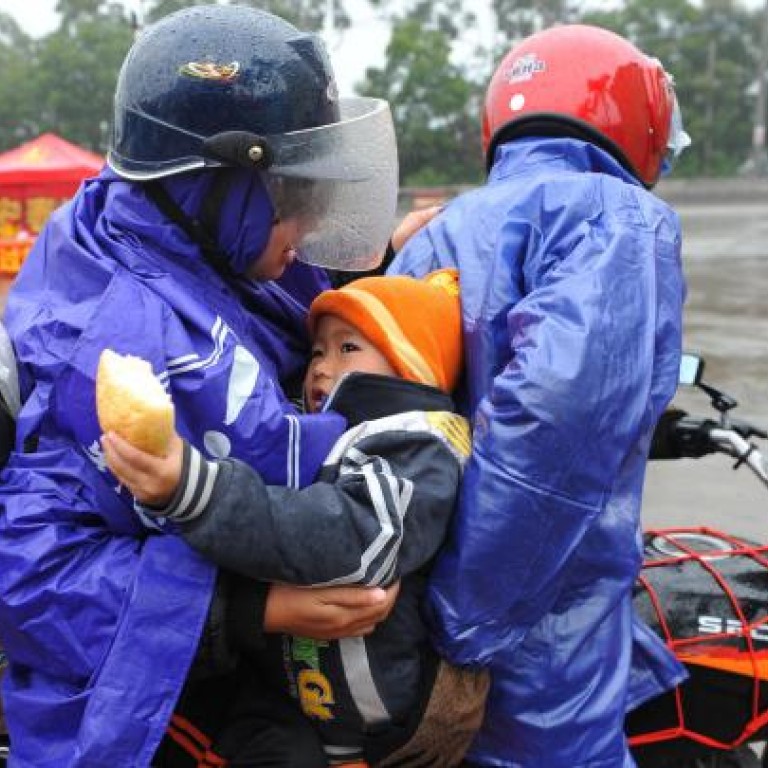
Motorbikes best option for migrants on Lunar New Year trek
Increasingly more workers aregoing home for the Lunar New Year holiday on motorcycles as other travel options become too costly
At 7am tomorrow, 35-year-old Yang Feng will be waiting for 12 travelling companions - all motorcycle riders - at Lijing Road in Zengcheng, Guangzhou.
From there, they will have a two-day ride to their homes in Hunan province, about 1,200 kilometres away.
Yang will lead the riders but he will have little idea about most of his companions - all migrant workers from Hunan working in different cities in the Pearl River Delta - until their departure.
Most have never met before but they've decided to join Yang's long ride home after seeing one of his online postings saying he was about to embark on his eighth ride home for a Lunar New Year family reunion.
Increasingly more migrant workers are riding motorbikes home from Guangdong for the annual holiday. In 2010, 100,000 people rode home for the Lunar New Year holiday, local media reported. The figure doubled to 200,000 in 2011 and doubled again to 400,000 last year.
Most of the bikes carry two migrant workers, sometimes with a child wedged between them, all equipped with safety helmets, bulky outerwear, leather gloves and knee pads for the long, cold ride home.
Yang and his team will be among the hundreds of millions of migrant workers in mainland cities expected to head home for the most important festival of the year. Indeed, the national transportation system is bracing for an estimated 3.4 billion journeys on trains, buses and ferries over the 40-day holiday period which started on Wednesday.
An estimated 140 million people in the Pearl River Delta will travel home between late last month and early this month, but only 32 million cheap train tickets were available.
This year, train tickets on standard trains, the cheapest way home, went on sale online 18 days ahead of time, but they sold out within 10 minutes every day. More than 80 per cent of the province's migrant workers have to find another way home.
Yang works in a factory in Huizhou and a train ticket from there to his home in Yueyang would cost about 100 yuan (HK$123). The next option would be a 600 yuan coach ticket, but that's nearly a fifth of his monthly salary as a specialised worker.
"The fare from Guangdong to Yueyang is usually 200 yuan or more, but it has been soaring from late January for the Lunar New Year," Yang said.
Long-distance coach drivers say inflation and expressway tolls have increased the pressure on their business. The 140-kilometre highway between Guangzhou and Shenzhen charges 70 yuan for five-seat vehicles and 220 yuan for coaches.
"On ordinary days we charge individual passengers 180 yuan per seat and take 40 passengers per bus for a single 12-hour journey between Shenzhen and Shaoyang in Hunan," a coach driver said. "Our profit is then reduced by fuel costs of 3,500 yuan and expressway tolls of 1,800 yuan, let alone paying the driver and operating costs.
"Driving overloaded during holidays is the only solution. We'd definitely go bankrupt if all coaches operated strictly according to the government's safety regulations."
As migrant workers find it too hard to buy a train ticket and too costly to travel home by plane, coach or high-speed train, motorcycles have become the transport of choice for many workers, especially those from neighbouring provinces such as Hunan, Guangxi and Jiangxi - within a 2,000-kilometre radius of Guangdong.
Yang and his team will ride along Highway 107, and the two-day journey will cost about 400 yuan in total for each motorbike.
"Most motorbike riders will only ride on free highways," Yang said. "That means we don't need to pay expensive expressway tolls like coaches and cars.
"During the trip, we need to refuel five or six times, costing about 300 yuan. We will eat instant noodles or bread when resting at petrol stations. If it rains, we will pay 80 yuan for a cheap inn room. If the weather is good, we will only have a rest on the roadside and set out again at dawn.
"Riding a motorbike continuously for hour after hour is very wearisome … the most important point is that we can still go home even if we can't buy a train ticket and can't afford high-speed trains or planes. You can't imagine how important it is for us to go home and reunite with our family members after a year of hardship in the cities."

